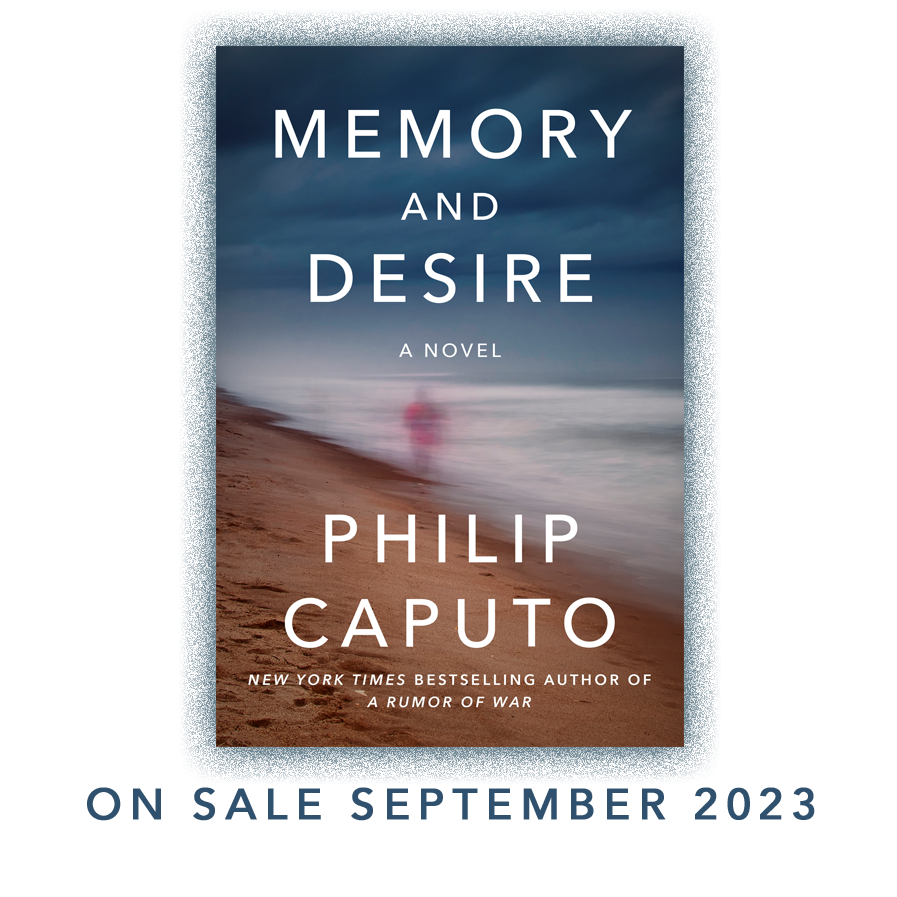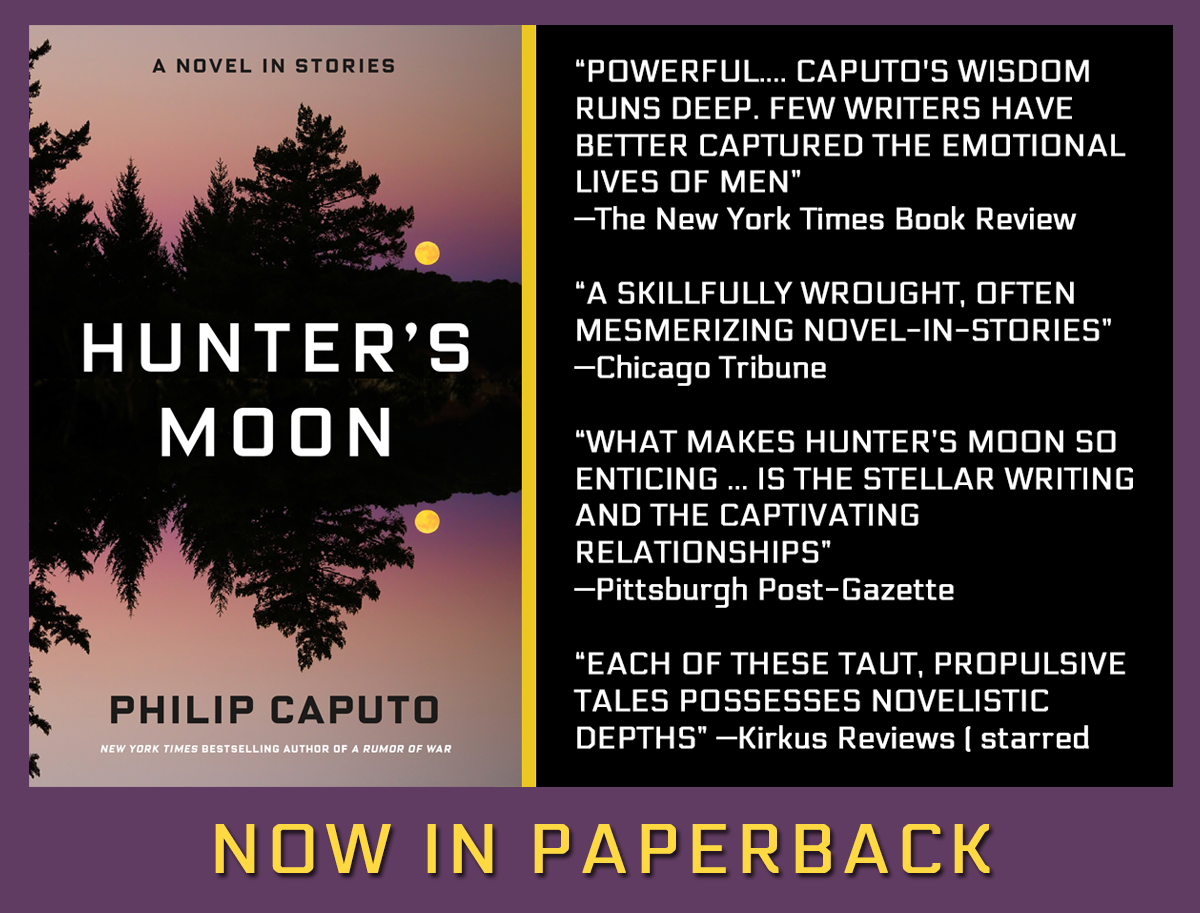“I wanted to create a virtual tour of duty,” said @PhilipCaputo as he kicks of audience Q&A. #BakerVietnam50
“Nothing can diminish the rightness of what you tried to do,” @PhilipCaputo reads from friend’s eulogy. #BakerVietnam50
06:32 PM – 09 Sep 15
Baker Institute
@BakerInstitute
Aug 27
9/9 at 5 p.m. #TheVietnamWar: 50 Years On. Speakers: Tim O’Brien, @PhilipCaputo, Larry Heinemann, & Tobias Wolff.
Four of us spoke at an event at Rice University in Houston earlier this month: Larry Heinemann, Tim O’Brien, Tobias Wolff, and I. We had been warriors who became writers, poets if you will of blood and fire. We’re in our 60s and 70s now, geriatric poets, our warrior days a long way behind us.
The event was sponsored by the Jones School of Business and the Baker Institute, a non-partisan think-tank started by former Secretary of State James Baker, a Houston native. The title of the two-day symposium/panel discussion was “Vietnam: 50 years On.” The 50 years refers to the beginning of America’s direct involvement in the Vietnam War in March, 1965 (though you could argue that a more accurate start date would be passage of the Tonkin Gulf Resolution in August, 1964, after which U.S. combat planes began to bomb North Vietnam).
I can hardly believe it’s been half a century since my brigade, the 9th Marine Expeditionary Brigade, landed at Danang with our packs, rifles, and heads full of illusions that the war would be over in a few weeks or months, ending in, of course, triumph for our side.
My memories of my 16 months in the war are so vivid that the names of the rivers and villages, the routes of the trails, the numbers of the hills are still as familiar to me as the names and addresses in my address book and the way to my local post office. I know that, because when I returned to Vietnam in 1999, on assignment for National Geographic Adventure magazine, I was able to navigate the rice paddies and jungles southwest of Danang without aid of a map.
Fifty years is a long time in a human life, but a tick or two of the second hand in historical time. Fifty years is the span between Pearl Harbor and Desert Storm, yet the difference between those two conflicts makes the former seem as remote as Waterloo. I was born in the same year as Pearl Harbor. About Fifty years separated my birth (June 10, 1941) from the Battle of Wounded Knee in late December, 1890. A long time, and no time at all. When I drew my first breath, there must have been Lakota warriors and cavalrymen around the age I am now still living in America, with their memories of frontier fights in the Old West.
There is a point to this. As the infant me suckled on his mother’s breast and Japanese bombs rained down on Hawaii, I very much doubt that aging veterans of Wounded Knee or the Apache campaigns were giving lectures and readings at universities. (Way bigger fish to fry in 1941). And if they did, I doubt even more that they drew the crowd we did — a standing-room-only audience of 500 plus. One of the event’s organizers, an Iraq-Afghanistan veteran named Mike Freedman, told me that tickets sold out within 36 hours of its announcements — faster, he said, than when Nelson Mandela spoke at Rice.
This is not braggadocio. I wondered, as I listened to Heinemann, O’Brien, and Wolff read from their books about Vietnam, and as I read from mine, Why in the hell are all these people, most of whom were born well after the war’s end, listening to us? If the event were a one-off, maybe that question would not have occurred to me; however, to this day, I must receive half a dozen requests a year to take part in seminars on the war, to speak at high schools and colleges. I must also receive twice as many requests to blurb or review war books, even though I’ve written many that have nothing to do with the subject.
Why this perpetual fascination with a war waged half a century ago in a small Asian nation on the far side of the world?
Vietnam was not the bloodiest war we’d fought (362,000 killed and wounded, as compared with 1.2 million in WWII and 600,000 in the Civil War), but it was the longest at the time (since exceeded by Afghanistan) and the only one we have ever lost. There is something captivating about lost causes. That said, I think the reason for Vietnam’s magnetism is its centrality to one of the most tumultuous, divisive, and transformative eras in our history, the Sixties. I don’t define that era by its chronological bookends, 1960-1970, but by two bracketing events, the assassination of President Kennedy on November 22, 1963 and the Fall of Saigon on April 30, 1975.
This period was a kind of cultural and social earthquake that changed America radically, and the country continues to feel its aftershocks. The war divided the America as it had not been since the Civil War, and that initial split has since spiderwebbed, like the crack in a windshield.
Obviously, had there been no war, there would have been no anti-war movement. But, as Michael Herr noted in his great memoir, “Dispatches,” warrior and anti-warrior seemed like opposite poles of an electrical circuit, drawing energy from the same source. And they fed current into the civil rights movement, which, as it transited from the nonviolence of Martin Luther King to the Black Panthers, took on the coloration of an insurgency.
The Sixties were a revolutionary time in the fullest sense of the word — bombs, bullets, blood on the streets of Watts, Chicago, Detroit, as in the alleys and byways of Saigon and Hue. My memories of the war at home are as vivid as those I have of the war far away. I covered the 1968 Chicago Democratic convention riots for the Chicago Tribune.The following year, I reported on the window-smashing, head-bashing “Days of Rage” staged by the Weather Underground. I clearly remember lying under a police car with two Chicago cops in a shoot-out between them and a heavily-armed street gang in the Cabrini-Green projects on Chicago’s west side. A few weeks later, I had to rescue my sister, besieged in her apartment when the assassination of Martin Luther King set off riots that made the west side look like the Tet Offensive.
It is not historical coincidence that the modern feminist movement and even the environmental movement also got their starts during the Sixties, for the war had caused millions of Americans to question assumptions that had governed our society for decades. (The guy brings home the bacon, the girl stays home with the kids and greets him with a kiss and a martini. The environment: dam the rivers, cut down the forests, pollute the air, because there is a buck to be made). Authority was undermined, government came to be distrusted. (Today, ironically, that mistrust has been transferred from the left to the conservatives). But the lefties of forty and fifty years ago concluded that something was fundamentally wrong about a country that dumped napalm on a distant Asian nation of no threat to it, while sending its sons to fight and die there for reasons no one could explain. Other Americans pushed back against the Weathermen, the Black Panthers, and the peace marchers, condemning them as virtual traitors. You can hear strong echoes of that dispute in the present election campaign, not to mention the arguments over our current wars in the Middle East and in Afghanistan.
It was an exciting time and a frightening time. For me, that paradoxical mood of thrilling dread was captured in the Credence Clearwater song, “Bad Moon Rising.”
The Sixties, and the war raging at its heart, changed the country forever, in some ways for the better, in other ways for the worse. However you look at it, the country we live in today was born then.
John Hellman, an Ohio State professor, sums up that transformation in his 1986 book, “American Myth and the Legacy of Vietnam.”
“Vietnam is an experience that has severely called into question American myth,” he writes. “Americans entered Vietnam with certain expectations that a story, a distinctly American story, would unfold. When the story of America in Vietnam turned into something unexpected, the true nature of the larger story of America itself became the subject of intense cultural dispute. On the deepest level, the legacy of Vietnam is the disruption of our story, of our explanation of the past and vision of the future.”
I could go on, but I’ll shut up now, leaving you to surmise what those expectations and that distinctly American story were.



I hope this isn’t out of place, Mr. Caputo, but I can’t imagine a different way of going about this. My dad is a huge fan of your work and would really appreciate a signed book. Could I possibly send you a copy of a book to be signed? It would mean a lot.
This is a good piece of writing and speaks with the authority of one who looks rather than merely thinking.
Hi, Tony. Thanks for the comment. I am intensely working on a new novel, which is why I haven’t answered your wonderful letters. When I’m done, I hope.
I have missed you and am very glad to hear from you directly. Thrilled so see how well absorbed you are in the work. Our correspondence can wait for quieter days. Lavada and I leave Monday for Seattle, for Glacier Park and then Banf. First time out of here since before I went on dialysis. My special greeting to the lovely Leslie, and Lavada sends her best.